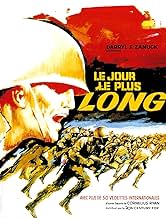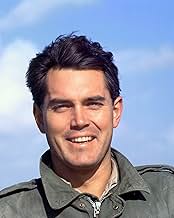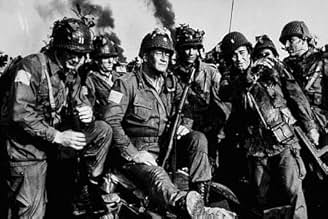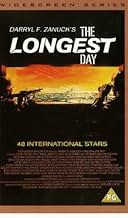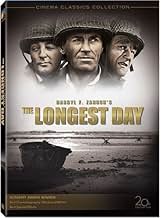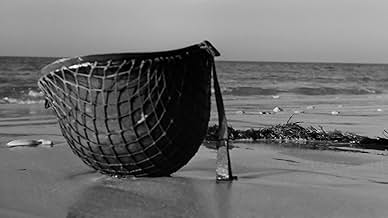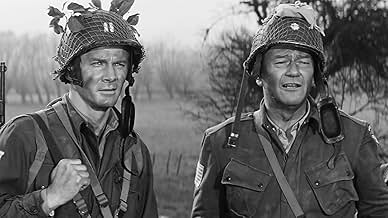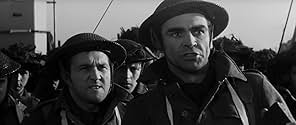IMDb RATING
7.7/10
62K
YOUR RATING
The events of D-Day, told on a grand scale from both the Allied and German points of view.The events of D-Day, told on a grand scale from both the Allied and German points of view.The events of D-Day, told on a grand scale from both the Allied and German points of view.
- Won 2 Oscars
- 8 wins & 6 nominations total
Irina Demick
- Janine Boitard
- (as Irina Demich)
Featured reviews
The Longest Day (1962) - CO-Directors: Ken Annakin & Andrew Morton Everyone knows this was producer Darryl F. Zanuck's baby and it earns its place in cinema history as one of those epic style movies that treats its subject matter with the most serious of attitudes. Obviously a war is no laughing matter but, for better or worse, movies tend to simplify logistics while highlighting emotional chords, such as bravery and homemade apple pie. Zanuck, however, wanted the audience to understand the scope and grandeur of an enterprise like D-Day.
Utilizing a cast of thousands, half of which seemed to be cameo appearances by major stars of the day, Zanuck presents on wide screen all the action and turmoil that surrounded this turning point of WW II. The ever-fighting Republican John Wayne is there, along with Democrat Henry Fonda, tough guy Bob Mitchum, brooding Richard Burton, sexy Sean Connery and pit bullish Rod Steiger. Still for my money, one of the best landing on the beach scenes ever filmed. Sorry Mr.Spielberg. (B&W)
Utilizing a cast of thousands, half of which seemed to be cameo appearances by major stars of the day, Zanuck presents on wide screen all the action and turmoil that surrounded this turning point of WW II. The ever-fighting Republican John Wayne is there, along with Democrat Henry Fonda, tough guy Bob Mitchum, brooding Richard Burton, sexy Sean Connery and pit bullish Rod Steiger. Still for my money, one of the best landing on the beach scenes ever filmed. Sorry Mr.Spielberg. (B&W)
THE LONGEST DAY is one of the if not the greatest World War II movie epics. However, it is unfair to compare it to Steven Spielberg's SAVING PRIVATE RYAN. To do so would really be comparing apples and oranges. Spielberg's movie was meant to convey the gore and horror of war and succeeded quite admirably. In THE LONGEST DAY, which was shot in semi-documentary style, Zanuck's intent was to show the monumental effort involved, on the part of the allies, in mounting a successful cross channel invasion. In that regard this film also succeeded quite admirably. It should be regarded more as a history lesson rather than as simply dramatic entertainment. The historical value of the film far outweighs any minor dramatic licenses taken by Zanuck.
Invariably compared with "Saving Private Ryan" (SPR), this scores over the more modern work because of the focus on all the major sides of the action (British, American, French and German).
All languages are used (with subtitles as appropriate - eg the Germans speak in German, etc).
While true that the battle scenes are not gory as SPR's, and that the sounds of battle are muted during the dialog (unlike SPR's), it should be borne in mind that in '62, the audience rating of the time *was* a General Release ("G" in the US, "A" in the UK (I'm guessing for the UK, but it is now PG)) - which more detail would not have allowed.
I think part of the purpose of this film is to allow *everyone* to see what happened 18 years before!
All languages are used (with subtitles as appropriate - eg the Germans speak in German, etc).
While true that the battle scenes are not gory as SPR's, and that the sounds of battle are muted during the dialog (unlike SPR's), it should be borne in mind that in '62, the audience rating of the time *was* a General Release ("G" in the US, "A" in the UK (I'm guessing for the UK, but it is now PG)) - which more detail would not have allowed.
I think part of the purpose of this film is to allow *everyone* to see what happened 18 years before!
The Longest Day works on several levels - the most obvious being the "don't blink or you might miss several" nature of the Star-Studded cast. Much of the cast works very well (Sean Connery's little comedy double act with Norman Rossington is an unexpected highlight). Some less so, and some is just downright tokenism - Rod Steiger getting all of 43 seconds on-screen for example. But overall, it's always a watchable movie - beautifully shot.
Some previous comment have surprised me, particularly the assertion that The Longest Day is, in any way, a "pro-war" film. I'm not sure if there *is* such a thing, but if there is then The LOngest Day certainly doesn't fall into this category - the scene of bewilderment between Richard Burton and Richard Beymer at the end about the confusion and directionlessness of war is the perfect example, ending with the memorable line "I wonder who won".
I'm also surprised that a European reviewer should have accused this film, of all world war II movies, of being American propoganda. I wonder how many other WWII films include both German and (almost unqiuely) French perspectives of the war to such an extent that almost half of the dialogue in them is in a language other than English. I find the German sequences in The Longest Day to be amongst the most interesting historically and dramatically.
The film is certainly as accurate as it's possible for a fictional movie to be - the list of advisors that it had working on it should prove that - including many people who are portrayed by actors in the movie itself. These include the characters played by Peter Lawford, Richard Todd and Kenneth More, along with several of the German field officers. Little touches that seem utterly out of place (like the nuns procession through the French village bringing a temporary ceasefire) are actually historically spot-on.
The final problem for the modern reviewer, of course, is the inevitable comparison between this film and Saving Private Ryan. But, as several other contributors have noted, SPR is not only the product of a different age with a different view of these events - historical as opposed to something which happened so recently that half of the audience are likely to have lived through them. But, ultimately, something usually forgotten about Operation Overlord is that Omaha Beach was merely one battle of a very long day indeed. Americans tend to focus on it because of the death toll, but the taking of Utah, Sword and Gold were just as important to the overall outcome. The Longest Day is a film about five beaches, many battles, and many men - some, as Richard Burton says, dead, some crippled and some lost. It is an anti-war film which proves that you can be anti-war and still celebrate and acknowledge heorism. The heroism of the young American and British troops, falling face-first into the salt water of the Normandy killing grounds. The incredible bravery of the Rangers who scaled the cliffs at Pointe du Luc on and, ultimately, meaningless mission. The heroism of the two Luftwaffe pilots commanded to face the invading armies alone, and who did so (another historically accurate point).
The Longest Day is a historic film about a historical event and it should be viewed as such.
9/10
Some previous comment have surprised me, particularly the assertion that The Longest Day is, in any way, a "pro-war" film. I'm not sure if there *is* such a thing, but if there is then The LOngest Day certainly doesn't fall into this category - the scene of bewilderment between Richard Burton and Richard Beymer at the end about the confusion and directionlessness of war is the perfect example, ending with the memorable line "I wonder who won".
I'm also surprised that a European reviewer should have accused this film, of all world war II movies, of being American propoganda. I wonder how many other WWII films include both German and (almost unqiuely) French perspectives of the war to such an extent that almost half of the dialogue in them is in a language other than English. I find the German sequences in The Longest Day to be amongst the most interesting historically and dramatically.
The film is certainly as accurate as it's possible for a fictional movie to be - the list of advisors that it had working on it should prove that - including many people who are portrayed by actors in the movie itself. These include the characters played by Peter Lawford, Richard Todd and Kenneth More, along with several of the German field officers. Little touches that seem utterly out of place (like the nuns procession through the French village bringing a temporary ceasefire) are actually historically spot-on.
The final problem for the modern reviewer, of course, is the inevitable comparison between this film and Saving Private Ryan. But, as several other contributors have noted, SPR is not only the product of a different age with a different view of these events - historical as opposed to something which happened so recently that half of the audience are likely to have lived through them. But, ultimately, something usually forgotten about Operation Overlord is that Omaha Beach was merely one battle of a very long day indeed. Americans tend to focus on it because of the death toll, but the taking of Utah, Sword and Gold were just as important to the overall outcome. The Longest Day is a film about five beaches, many battles, and many men - some, as Richard Burton says, dead, some crippled and some lost. It is an anti-war film which proves that you can be anti-war and still celebrate and acknowledge heorism. The heroism of the young American and British troops, falling face-first into the salt water of the Normandy killing grounds. The incredible bravery of the Rangers who scaled the cliffs at Pointe du Luc on and, ultimately, meaningless mission. The heroism of the two Luftwaffe pilots commanded to face the invading armies alone, and who did so (another historically accurate point).
The Longest Day is a historic film about a historical event and it should be viewed as such.
9/10
The previous comments about Canadian participation in the Normandy invasion were significant - insofar as there weren't very many. One of the five Normandy beaches was Canadian (Juno), but there is almost no mention of this in The Longest Day, and I'm sure that one would be hard pressed to find many Americans (and not a whole lot more Canadians) who know this. Unfortunately, it is movies such as this and other popular media that shape the historic knowledge of people on both sides of the border. In the near absence of Canadian content, I find it ironic that a young Canadian (Paul Anka) not only played a part in the movie as an American soldier, but also wrote the theme music. I find it also ironic that the legendary rifle used by US soldiers during WW2 and shown in this movie was designed by a Canadian as well (Garand is a French Canadian name). The cruelest irony, of course, is the fact that thousands of Canadian soldiers were maimed or lost there lives on 6 June 1944 and the days thereafter, with virtually no acknowledgement in this movie. I have always enjoyed watching this movie, but it is unfortunate that I must use my imagination to see in it the heroic and selfless wartime effort of my father's generation, in similar fashion to viewers in the US and UK.
Did you know
- TriviaWhile clearing a section of the Normandy beach near Pointe du Hoc, the crew unearthed a tank that had been buried in the sand since the original invasion. Mechanics cleaned it off, fixed it up and it was used in the movie as part of the British tank regiment.
- GoofsA compound fracture of the ankle indicates blood and/or protruding bones, of which Vandervoort's ankle had none. It also would have been impossible to put any weight on the ankle.
- Quotes
Flight Officer David Campbell: The thing that's always worried me about being one of the few is the way we keep on getting fewer.
- Crazy creditsThere is a 20-second overture on a black screen, no 20th Century Fox logo (in spite of this being one of their most expensive productions), and a six-minute cold open before the title is displayed. Apart from the title, there are no credits at the beginning of the film. All cast and crew credits are at the end of the film.
- Alternate versionsSome video copies omits Jean Servais scenes as a Free French admiral making a short speech to his crew before the shore bombardments starts.
- ConnectionsEdited into La guerre, la musique, Hollywood et nous... (1976)
Details
- Release date
- Country of origin
- Official site
- Languages
- Also known as
- The D. Day
- Filming locations
- Sainte-Mère-Eglise, Manche, France(parachutists landing in the village)
- Production company
- See more company credits at IMDbPro
Box office
- Budget
- $10,000,000 (estimated)
- Runtime
- 2h 58m(178 min)
- Color
- Black and White(original version)
- Aspect ratio
- 2.35 : 1
Contribute to this page
Suggest an edit or add missing content


